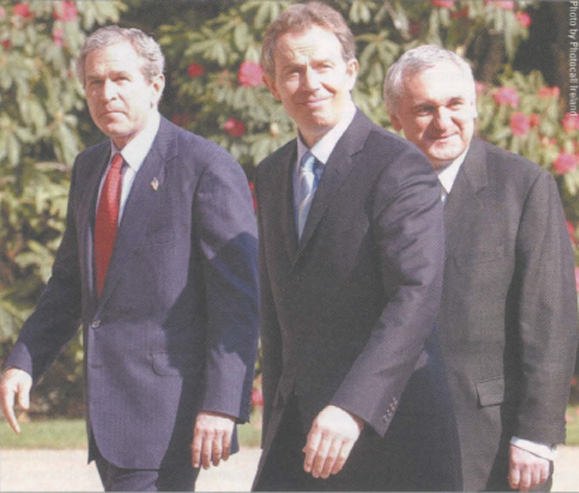But Belfast Agreement Is Still Stalled
℘℘℘
Five years since the signing of the historic Belfast Agreement, political commentators in Northern Ireland are increasingly pessimistic that further progress can be made. The key points of the Agreement have proven difficult – if not impossible – to renegotiate, and as we go to press, talks on devolved power in the North are effectively deadlocked.
Even after President George W. Bush’s April visit to Belfast, diplomatic attempts to re-charge the talks have failed. The timing is significant because elections to the Northern Assembly are already overdue. With the Orange marching season imminent always a time to revive sectarian tensions – pro-Agreement parties and government sources in Dublin and London are fearful that stalemate will produce a dangerous political vacuum this summer.
The Belfast Agreement provided common ground for both communities, but anti-Agreement unionists openly doubted whether the aspirations of the 1998 breakthrough could ever be put into practice. They are not prepared to do business with republicans represented by Sinn Fein and do not trust the independent arms decommissioning process set up five years ago. Moving to the next stage of conflict resolution has certainly proved tortuous.
Even the pro-Agreement Ulster Unionist Party (UUP) is split on proceeding with the Agreement. UUP leader David Trimble faces staunch opposition within his own party while the Rev Ian Paisley’s Democratic Unionist Party (DUP) has gained electoral ground among unionist voters by opposing the Agreement completely.
Nationalists and republicans are broadly supportive of making the five-year-old accord work. The SDLP (Social Democratic Labour Party) is firmly behind it, but for Sinn Fein, a devolved form of statehood for Northern Ireland has been a tough sell to hardline republicans.
After Bush’s visit on April 7 it was hoped that intensive negotiations might produce a formula to put the talks back on track. Although Bush‘s appearance at Hillsborough Castle might have inspired participants, there was no mi staking that the real agenda of the day was Iraq. There was also a perception that President Bush visited the British Prime Minister in Belfast rather than Downing Street so as to preclude sparking a massive anti-war demonstration in London.
Following his departure, special envoy Richard Haass stayed on to maintain close contact with Washington. As far as most participants are concerned, a key to implementing the Belfast Agreement is that the IRA conveys a readiness to lay down arms once and for all. In a move that sidelines the existing decommissioning body under General John de Chastelain, the UUP wants verifiable proof that IRA weapons are put beyond use. Finding a new way to monitor the destruction of IRA weapons has become a sticking point in negotiations. For David Trimble and his supporters, IRA decommissioning must be credible if the threat of violence is to be removed from the equation. Otherwise, the UUP will not back any development.
However, the IRA statement when finally issued did not meet expectations. The Irish and British governments expressed disappointment that it was too ambiguous and did not go far enough in placating pro-Agreement unionists. Additional pressure has been brought to bear on Sinn Fein to win a clear and committed statement from the IRA leadership.
But time is pressing once more.
Much to the anger of anti-Agreement parties, elections for the Northern Ireland Assembly were postponed on May l. The intention was to provide breathing space for participants to come up with a workable formula. However, the four-week time-out has failed to produce a result and the elections now loom on May 29. It is highly unlikely that Taoiseach Ahern and Prime Minister Blair would be prepared to postpone again. However, it is equally unlikely that pro-Agreement parties would be enthusiastic about campaigning for a devolved government that does not exist. ♦


Leave a Reply